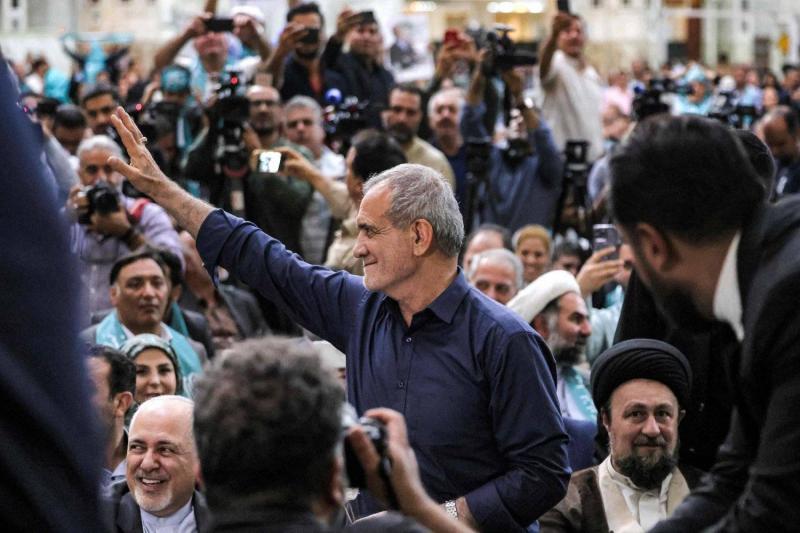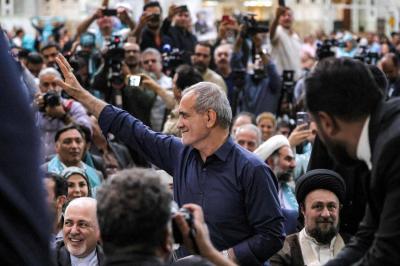The level of participation in the second round of the Iranian presidential elections increased by about 10% compared to the first round, with total participation reaching approximately 50%, totaling 35 million and 530 thousand votes. Masoud Bezhkian received 16.384 million votes, surpassing his opponent Saeed Jalili, who garnered 13.538 million votes. With Bezhkian's victory, reformists returned to power through the executive branch once more.
Following the election of the moderate reformist president Bezhkian, speculations began regarding the composition of his cabinet, which he will present to the conservative parliament for approval. It is expected that the president will face genuine challenges from the legislative branch, which may not agree to select specific reformist figures.
Additionally, the elected president may be compelled to collaborate with conservatives, thereby creating a government similar to Hassan Rouhani's, which combined conservatives, reformists, and moderates to allow the parliament to facilitate his government’s formation. According to the conservative "Tabnak" website, there is a pessimistic outlook in political circles that suggests the government of doctors will be hastily formed and may not last long due to upcoming challenges. Believers in this pessimistic view consider the twelfth parliament a center of opposition at any cost, using various justifications against Bezhkian's government and its members.
Nonetheless, Bezhkian possesses a reconciliatory personality that prefers negotiation over conflict with the parliament. This trait allows him to bridge gaps among all factions. However, excessive reliance on reconciliation could yield adverse results, possibly leading to the failure and regression of the government against a diverse current in the Iranian state's structure.
On the other hand, Iranian journalist Beigman Tahouri notes on "Iran Wire" that the increased voter turnout in the second round represented an unprecedented event, as it is customary for turnout to decline in second rounds of elections. The polarization seen in the elections stemmed from voters choosing between the reformist front and the hardliner front, resulting in higher voter participation. In reality, the public's choice of Bezhkian indicates a desire to prevent the executive branch from remaining under hardliner control.
This conclusion suggests that the elected president will rely on votes that legitimized the regime, as reiterated by Iranian Supreme Leader Ali Khamenei, alongside Bezhkian's election as president, who could maneuver this card against hardline conservatives.
With Bezhkian's victory announced, attention shifts to the composition of his government and potential changes in Iran's political, economic, and social landscapes in the near future. Reviewing Bezhkian's statements during debates, interviews, and election speeches reveals his emphasis on the following points:
- Internal disagreements must be set aside for dialogue.
- The country cannot be managed by a single current.
- I am the voice of the voiceless and will advocate for the 60% who boycotted the election.
- We will build Iran together.
- Equality among all ethnicities.
- Defense of women's rights.
- Continuation of nuclear negotiations.
- Development of international relations through dialogue.
- Combatting poverty.
During Bezhkian's election campaign, there was notable attendance of reformists, conservatives, and moderates at his campaign headquarters. In light of this, experts on Iranian affairs suggest that this presence indicates the upcoming Bezhkian government will be a "national unity" or "national reconciliation" government with a technocratic hue, with reformists and moderates forming the core of the cabinet he will present to the conservative-led parliament.
Accordingly, speculations about Bezhkian's proposed list to parliament have increased following the confirmation of the election's validity by the Guardian Council and the Supreme Leader's endorsement of the presidency and oath-taking before parliament.
Constitutionally, the president in Iran is the second most powerful figure after the Supreme Leader, who holds absolute authority. When selecting ministers for sovereign ministries such as defense, interior, foreign affairs, intelligence, and oil, the president is obliged to consult the Supreme Leader.
**Foreign Policy**
Foreign policy is likely to be the most visible aspect of the new Iranian government's agenda, given the role played by former Foreign Minister Mohammad Javad Zarif as an advisor to Bezhkian during his election campaign. While Zarif may not personally wish to return to the foreign ministry, he will undoubtedly have a decisive voice in nominating the new foreign minister.
Among the names being mentioned for this position is Abbas Araghchi, Zarif's deputy during Rouhani's administration. Other potential candidates include Mohammad Sadr, who served as deputy foreign minister in reformist President Mohammad Khatami's government, and Ali Akbar Salehi, the foreign minister under Mahmoud Ahmadinejad. It is expected that the foreign policy will be managed by the likely advisor Bezhkian, Javad Zarif, although the parliament may not approve Zarif as foreign minister; he could still be appointed as an advisor to the elected president.
**Economic and Energy Affairs**
The most sensitive component of the cabinet is the economic team, which includes the ministers of economy and finance, roads and urban development, industry, mining, and trade, and agricultural jihad, alongside the central bank and planning and management directorate. It is not yet clear who will head any of these ministries, but economic expert Ali Tayebnia, who previously served as economy minister under Rouhani, is expected to lead Bezhkian's economic team. Another name emerging in the economic sector is Hossein Abdollah Tabarizi, a key economic advisor to Bezhkian, who may be appointed as the president’s top economic advisor. In political circles, the name of former Tehran mayor Pirouz Hanachi is widely considered a serious option for the Ministry of Roads, Urban Development, and Housing.
Regarding the energy and oil ministries, President Bezhkian may nominate Hamid Chitchian as Minister of Energy, especially since he had previously protested in parliament against Chitchian's exclusion from Rouhani's cabinet, viewing him as a successful minister.
**Social and Cultural Affairs**
One of the government’s upcoming challenges will be to tackle poverty and its social repercussions, as well as significant health and education issues in the country, especially as these can determine the government's success or failure.
Ahmad Madari is likely to lead the Ministry of Labor, Cooperatives, and Social Welfare. The possibility of appointing a woman to a ministerial position in Bezhkian's government is very high, and either the Ministry of Health or the Ministry of Education may be handed to a woman. When he served as deputy speaker of the Iranian parliament, Bezhkian criticized former President Rouhani for not nominating women for ministerial positions. Potential female candidates include Masoumeh Ebtekar, Fatemeh Bahrami, and Soorana Sotari.
It is also likely that former culture ministry deputy Hussein Nazemi or former culture ministers Ahmad Masjid Jamei and Reza Salehi Amiri, or former deputy parliamentary speaker Ali Motahari, may be considered for the Ministry of Culture and Islamic Guidance.
**Intelligence, Communications, and Security**
Mohammad Javad Azari Jahromi, the Minister of Communications and Information Technology in Rouhani's government, played a significant and influential role in Bezhkian's electoral campaign. He is likely to be nominated again for the same ministry or for any other position in the elected president's government. Other critical ministries that could be assigned to Azari Jahromi include the Ministry of Youth and Sports or the Supreme Council of Cyberspace.
As for the Ministry of Intelligence, it may return to Mahmoud Alavi, who held this post in Rouhani's administration as well, with another potential candidate being Ali Younesi, the intelligence minister during President Khatami's term. Bezhkian may also consider Majid Ansari, a former parliamentary affairs assistant under Khatami and Rouhani, as well as former Interior Minister and one of Bezhkian's competitors in the recent presidential election, Mostafa Pour Mohammad.
It is expected that Bezhkian's government will include a woman as vice president for women’s affairs, along with the nomination of a woman for ministerial office. The Iranian president may also choose a Sunni figure in his government, despite the strong opposition he may face in this regard. Additionally, it is anticipated that a representative for non-Persian ethnicities will be appointed in the government, especially since Bezhkian belongs to the Azerbaijani Turkish ethnicity, and the majority of non-Persian provinces voted in his favor.




